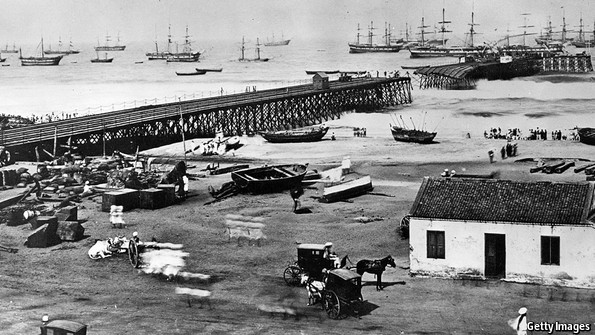A new naval base in Bahrain is an echo of the past
IN 1968 a cash-strapped Labour government, asserting its anti-colonialist credentials, announced Britain’s military withdrawal from all its bases east of Aden (a port—pictured in 1864—in what is now Yemen
, that was a coaling station on the way to India). For many, what became known as the “East of Suez” declaration marked the formal end of the British empire. Now, nearly 50 years later, the Royal Navy is to get a new permanent base at Mina Salman in Bahrain.
In reality, Britain never left the Gulf. It has long-standing security ties with Oman, Qatar, Saudi Arabia and the United Arab Emirates (where the Royal Air Force operates a Typhoon fighter-jet squadron from Al-Minhad, a base in Dubai that has also acted as a logistical bridge for operations in Afghanistan). But that is not to deny the significance of the plan to develop part of Mina Salman (which is also home to America’s Fifth Fleet) into a facility able to accommodate the latest Type 45 destroyers and two new aircraft carriers when they enter service towards the end of the decade.
The move is a reflection of the present government’s desire to demonstrate Britain’s revived commitment to the Gulf monarchies, with whom it maintains substantial trading and investment relationships, at a time of increasing turbulence in the region.
Signing the agreement to establish the base on December 5th with his Bahraini counterpart, Sheikh Khalid bin Ahmed al-Khalifa, Britain’s foreign secretary, Philip Hammond, declared: “Your security is our security.” Under the terms of the deal, Bahrain will meet most of the £15m price tag for building the facility, while Britain will be responsible for its operating costs. As well as being able to take bigger ships which pack more punch than the four Royal Navy minesweepers that currently sail from Mina Salman, Britain will be able to make its shrinking fleet go further by not having to rotate vessels back and forth to home ports.
Another explicit reason for re-establishing a permanent naval presence in the Gulf is to show the Americans that, in the aftermath of Afghanistan, Britain (with France) remains a useful and reliable ally. Mr Hammond said: “As the United States focuses more of its effort on the Asia-Pacific region, we and our European partners will be expected to take a greater share of the burden in the Gulf, the Near East and North Africa.” British military advisers still see those territories as the ones where the country’s armed forces are most likely to be called upon to fight. Having bases where British forces can train in hot and dry conditions will remain important.
For all that, the timing of the Bahrain agreement strikes some as odd. Human Rights Watch, a lobbying group, criticised Britain for announcing the move only a month after the House of Commons committee on foreign affairs issued a damning verdict on the glacial pace of political reform in Bahrain. Dissidents remain in jail following widespread protests in 2010-11.
Shashank Joshi of RUSI, a think-tank, says that it sends a message suggesting “a narrow and myopic” definition of regional stability. It also appears to pre-empt the 2015 Strategic and Defence and Security Review. In a report for RUSI last year, Gareth Stansfield and Saul Kelly raised the concern that the force Britain could deploy in the Gulf might be “large enough to get us into trouble, but too small to get us out of trouble once it starts”. That is an argument that would have resonated 50 years ago.


No comments:
Post a Comment